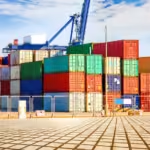The logistics industry is undergoing a profound transformation, driven by the rapid advancement of technology. From artificial intelligence to blockchain, these innovations are revolutionizing how freight is managed, tracked, and delivered. This technological evolution promises not only to enhance efficiency and reduce costs but also to create a more transparent, sustainable, and resilient supply chain. Let’s explore how key technologies are reshaping the future of freight logistics.
Artificial Intelligence (AI) and Machine Learning
Predictive Analytics
AI and machine learning algorithms analyze vast amounts of data to predict demand, optimize routes, and manage inventory. Predictive analytics allows logistics companies to anticipate market trends, reduce downtime, and improve resource allocation. For instance, AI can forecast potential disruptions, such as weather conditions or traffic congestion, enabling proactive adjustments to delivery schedules.
Automation and Robotics
Automation is streamlining warehouse operations through the use of robots for tasks such as picking, packing, and sorting. Autonomous vehicles and drones are being developed for freight transport, promising to reduce labor costs and increase efficiency. These technologies enhance precision and speed, minimizing human error and operational delays.
Internet of Things (IoT)
Real-Time Tracking
IoT devices provide real-time tracking of goods throughout the supply chain. Sensors attached to containers and vehicles monitor location, temperature, humidity, and other critical factors. This data is transmitted to centralized systems, offering unparalleled visibility and enabling swift responses to any issues that arise.
Predictive Maintenance
IoT sensors on trucks and machinery can predict maintenance needs before a breakdown occurs. By monitoring the condition of equipment, logistics companies can schedule timely repairs and replacements, reducing downtime and extending the lifespan of their assets. This proactive approach minimizes disruptions and ensures smoother operations.
Blockchain Technology
Enhanced Transparency
Blockchain offers a decentralized and immutable ledger system, enhancing transparency and trust across the supply chain. Each transaction is recorded in a tamper-proof digital ledger, providing an auditable trail from origin to destination. This transparency helps prevent fraud, reduces paperwork, and simplifies dispute resolution.
Smart Contracts
Smart contracts automate and enforce agreements between parties in the supply chain. These self-executing contracts are stored on the blockchain and automatically trigger actions, such as payments or shipment releases, when predefined conditions are met. This automation reduces administrative overhead and ensures compliance with contractual terms.
Big Data and Analytics
Data-Driven Decision Making
Big data analytics processes massive datasets to uncover patterns, trends, and insights that drive strategic decision-making. Logistics companies can analyze data from various sources, such as GPS systems, RFID tags, and customer feedback, to optimize routes, manage inventory, and improve customer service. Data-driven insights enable more informed and agile decision-making.
Supply Chain Optimization
Analytics tools optimize supply chain performance by identifying inefficiencies and areas for improvement. For example, analyzing transportation routes can reveal opportunities to consolidate shipments, reduce empty miles, and lower fuel consumption. This optimization leads to cost savings and enhanced operational efficiency.
Autonomous Vehicles and Drones
Driverless Trucks
Autonomous trucks are poised to revolutionize long-haul freight transport. These vehicles can operate around the clock without the need for rest breaks, significantly increasing productivity. Advanced sensors and AI systems ensure safe navigation, reducing the risk of accidents and human error.
Drone Deliveries
Drones offer a solution for last-mile deliveries, particularly in remote or congested urban areas. They can swiftly transport small packages, bypassing traffic and reducing delivery times. As drone technology advances, it promises to become an integral part of the logistics ecosystem, enhancing delivery speed and convenience.
Sustainable Technologies
Electric and Hybrid Vehicles
The adoption of electric and hybrid vehicles in logistics is reducing carbon emissions and dependence on fossil fuels. These eco-friendly alternatives not only lower environmental impact but also offer cost savings through reduced fuel consumption and maintenance costs.
Renewable Energy Integration
Logistics facilities are increasingly integrating renewable energy sources, such as solar panels and wind turbines, to power operations. This shift towards sustainable energy reduces carbon footprints and aligns with global efforts to combat climate change.
Conclusion
The future of freight logistics is being shaped by a convergence of cutting-edge technologies that promise to enhance efficiency, transparency, and sustainability. From AI and IoT to blockchain and autonomous vehicles, these innovations are revolutionizing how goods are transported and managed. As the logistics industry continues to embrace these advancements, businesses will benefit from streamlined operations, reduced costs, and improved customer satisfaction. Embracing technology is no longer an option but a necessity for staying competitive in the rapidly evolving world of freight logistics.



